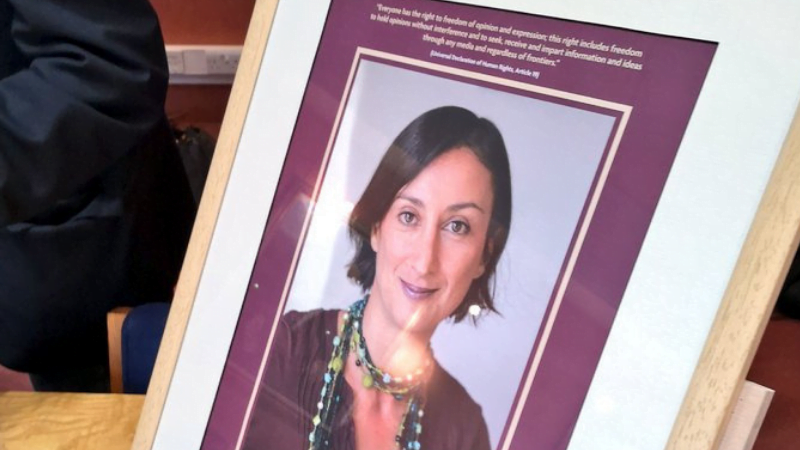His mother’s fight against corruption highlighted the need for reform in Europe as it served as an extreme example of what can occur following years of abuse of defamation law, Matthew Caruana Galizia said at a conference organised by the University of Aberdeen on Monday.
“If she had capitulated, she’d still be alive. But we were never more proud of her than on the day she was murdered. Those who wished to silence her had not been able to do so through any other means. She had a special type of personality which led her to dig her heels in, determined not to be silenced,” Caruana Galizia said.
The conference organised by the Centre for Private International Law started off with an unveiling of a portrait of Daphne Caruana Galizia, “the last bastion of the rule of law” in Malta.
“From this day forward, this portrait of Daphne Caruana Galizia will remind thousands of students at the University of Aberdeen of the importance of freedom of expression and the functioning of the rule of law,” Justin Borg-Barthet said.
Organised by Borg Barthet, senior lecturer in EU law at the university’s law school, the conference brought together global press freedom NGOs, journalists, representatives of EU institutions, and legal scholars, debating ways of addressing the weaknesses in defamation law which allow powerful entities to suppress freedom of expression.
Genuinely proud of @aberdeenuni today. From this day forward, this portrait of #DaphneCaruanaGalizia will daily remind thousands of students at @AberdeenUniLaw of the importance of freedom of expression to the functioning of the rule of law. Thank you. https://t.co/PoPdkfbwfu
— Justin Borg-Barthet (@JustinBBarthet) March 4, 2019
The research underpinning the event was prompted by the redaction and deletion of press reports of money laundering in an EU member state, Malta, following vexatious use of private international law rules, the University said, with reference to the removal of articles in the Maltese independent media following the threat of libel suits in foreign jurisdictions by Pilatus Bank.
It noted in a statement that Caruana Galizia was one of the only journalists who refused to submit to demands to alter online content concerning these alleged crimes was assassinated.
The conference focused particularly on Strategic Lawsuits Against Public Participation (SLAPP) that are intended to financially cripple journalists through threats of lawsuits in foreign jurisdictions where it would be impossible for media workers in other countries to mount a defence.
Gill Phillips, the Guardian and Observer’s lawyer, added that new trends are emerging whereby powerful entities use laws which are not designed to deal with freedom of expression to suppress press reports. She observed that while claims based on data protection and intellectual property are usually unfounded, lawyers must be mindful of the scattergun tactics deployed by subjects of journalists’ revelations.
The Shift News also received similar threats from Henley & Partners, the global firm that designed Malta’s cash-for-passports programme and remains its main concessionaire. The news portal refused to remove the content and published the letter received and the response.
Borg-Barthet spoke of the chilling effect of libel actions, arguing that a well functioning legal order required scrutiny of actions of both public officials and private entities. Investigative journalism was indispensable to this aim, he said.
The conference coincided with the publication of an academic working paper by Borg-Barthet (‘The Brussels I Regulation as an Instrument for the Undermining of Press Freedoms and the Rule of Law: an Urgent Call for Reform’).
He explained how the Brussels I regulation was used to suppress both the right to free speech and the right to access to the courts. He argued for reform of jurisdictional rules within the EU.
“Journalists should be able to predict where they could be sued,” he said, arguing they should be sued only in their domicile.
The conference also heard how in Malta, the burden of proof falls on the journalist, leading Borg-Barthet to argue for a harmonisation of minimum standards of national law on burden of proof.
Professor Alex Mills from University College London also noted that there was a need to harmonise rules on which national law was to be applied in defamation cases. Common rules could increase predictability and limit the attraction of abusive forum shopping, he said.
The discussions aimed at informing NGOs’ advocacy efforts concerning legal reforms to preserve press freedoms in the run-up to European Parliament elections and the appointment of a new European Commission.
Tom Gibson from the Committee to Protect Journalists said investigative journalism played a positive role in helping the EU institutions police Member States and their compliance with the rule of law. “The EU is not just a single market but also a community of values,” he said.
Other stakeholders and experts participating include Rebecca Vincent, UK Director Bureau for Reporters Without Borders who chaired the panel debate, Flutura Kusari, Legal Advisor to the European Centre for Press and Media, IPI Deputy Director Scott Griffen, Sarah Clarke from Article 19 and lawyer Caoilfhionn Gallagher.













